Related Research Articles

The Libertarian Party (LP) is a political party in the United States that promotes civil liberties, non-interventionism, laissez-faire capitalism, and limiting the size and scope of government. The party was conceived in August 1971 at meetings in the home of David F. Nolan in Westminster, Colorado, and was officially formed on December 11, 1971, in Colorado Springs. The organizers of the party drew inspiration from the works and ideas of the prominent Austrian school economist, Murray Rothbard. The founding of the party was prompted in part due to concerns about the Nixon administration, the Vietnam War, conscription, and the introduction of fiat money.
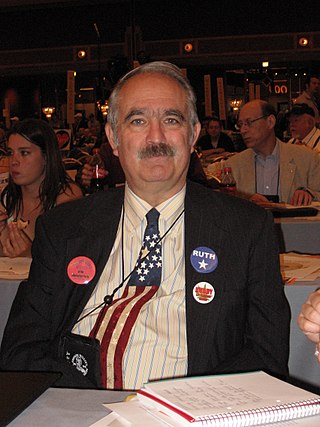
David Fraser Nolan was an American activist and politician. He was one of the founders of the Libertarian Party of the United States, having hosted the meeting in 1971 at which the Party was founded. Nolan subsequently served the party in a number of roles including National Committee Chair, editor of the party newsletter, Chair of the By-laws Committee, Chair of the Judicial Committee, and Chair of the Platform Committee.
American electoral politics have been dominated by successive pairs of major political parties since shortly after the founding of the republic of the United States. Since the 1850s, the two largest political parties have been the Democratic Party and the Republican Party—which together have won every United States presidential election since 1852 and controlled the United States Congress since at least 1856. Despite keeping the same names, the two parties have evolved in terms of ideologies, positions, and support bases over their long lifespans, in response to social, cultural, and economic developments—the Democratic Party being the left-of-center party since the time of the New Deal, and the Republican Party now being the right-of-center party.

The Reform Party of the United States of America (RPUSA), generally known as the Reform Party USA or the Reform Party, is a centrist political party in the United States, founded in 1995 by Ross Perot.
The Libertarian National Convention is held every two years by the Libertarian Party to choose members of the Libertarian National Committee (LNC), and to conduct other party business. In presidential election years, the convention delegates enact a platform and nominate the Libertarian presidential and vice-presidential candidates who then face the nominees of other parties in the November general election.

Edward E. Clark is an American lawyer and politician who ran for governor of California in 1978, and for president of the United States as the nominee of the Libertarian Party in the 1980 presidential election.

Theodora Nathalia "Tonie" Nathan was an American radio producer, television producer, and political activist. She was the first woman to receive an electoral vote in a United States presidential election. She was the 1972 vice presidential nominee of the Libertarian Party and running mate of John Hospers, when Roger MacBride, a Republican elector from Virginia, cast the historic vote as a faithless elector.

Neo-Confederates are groups and individuals who portray the Confederate States of America and its actions during the American Civil War in a positive light. The League of the South, the Sons of Confederate Veterans and other neo-Confederate organizations continue to defend the secession of the former Confederate States.
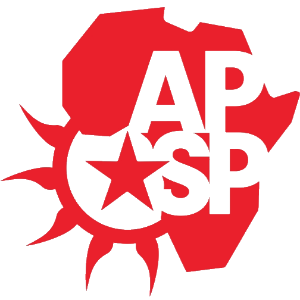
The African People's Socialist Party (APSP) is a pan-Africanist political party and organization working towards reparations for slavery in the United States, identifying ideologically with African internationalism and African socialism. The party was formed in May 1972 by the merger of three black power organizations based in Florida and Kentucky. Omali Yeshitela, one of the original co-founders, leads the APSP as of 2019.
Libertarianism is a political philosophy that upholds liberty as a core value. Libertarians seek to maximize autonomy and political freedom, emphasizing equality before the law and civil rights to freedom of association, freedom of speech, freedom of thought and freedom of choice. Libertarians are often skeptical of or opposed to authority, state power, warfare, militarism and nationalism, but some libertarians diverge on the scope of their opposition to existing economic and political systems. Various schools of libertarian thought offer a range of views regarding the legitimate functions of state and private power. Different categorizations have been used to distinguish various forms of Libertarianism. Scholars distinguish libertarian views on the nature of property and capital, usually along left–right or socialist–capitalist lines. Libertarians of various schools were influenced by liberal ideas.
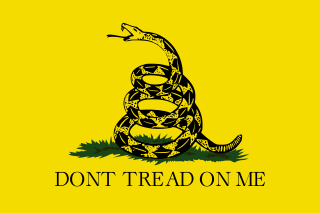
In the United States, libertarianism is a political philosophy promoting individual liberty. According to common meanings of conservatism and liberalism in the United States, libertarianism has been described as conservative on economic issues and liberal on personal freedom, often associated with a foreign policy of non-interventionism. Broadly, there are four principal traditions within libertarianism, namely the libertarianism that developed in the mid-20th century out of the revival tradition of classical liberalism in the United States after liberalism associated with the New Deal; the libertarianism developed in the 1950s by anarcho-capitalist author Murray Rothbard, who based it on the anti-New Deal Old Right and 19th-century libertarianism and American individualist anarchists such as Benjamin Tucker and Lysander Spooner while rejecting the labor theory of value in favor of Austrian School economics and the subjective theory of value; the libertarianism developed in the 1970s by Robert Nozick and founded in American and European classical liberal traditions; and the libertarianism associated with the Libertarian Party, which was founded in 1971, including politicians such as David Nolan and Ron Paul.

The Libertarian Party of Oregon is a political party representing the national Libertarian Party in the U.S. state of Oregon. It is organized as a minor party for state election law, and recognized by the Oregon as a statewide nominating party.
Anarchism as a social movement in Cuba held great influence with the working classes during the 19th and early 20th century. The movement was particularly strong following the abolition of slavery in 1886, until it was repressed first in 1925 by President Gerardo Machado, and more thoroughly by Fidel Castro's Marxist–Leninist government following the Cuban Revolution in the late 1950s. Cuban anarchism mainly took the form of anarcho-collectivism based on the works of Mikhail Bakunin and, later, anarcho-syndicalism. The Latin American labor movement, and by extension the Cuban labor movement, was at first more influenced by anarchism than Marxism.

The Libertarian Party of Nevada (LPN) is the affiliate of the Libertarian Party in the state of Nevada. It is headed by State Chair Charles Melchin.
The Libertarian Party of the United States was formed in Colorado Springs in the home of Luke Zell by a group of individuals led by David Nolan on December 11, 1971, after several months of debate among members of the Committee to Form a Libertarian Party, founded July 17. The formation was prompted in part by price controls and the end of the Gold Standard implemented by President Richard Nixon. The Libertarian Party viewed the dominant Republican and Democratic parties as having diverged from what they viewed as the libertarian principles of the American Founding Fathers. This group included John Hospers, Edward Crane, Manuel Klausner, Murray Rothbard, Roy Childs, D. Frank Robinson, Theodora (Tonie) Nathan, and Jim Dean.
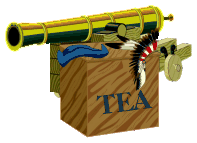
The Boston Tea Party (BTP) was a United States libertarian political party named after the event known as the Boston Tea Party of 1773. It was founded in 2006 by a group of former Libertarian Party (LP) members, who criticized the LP for its "abdication of political responsibilities", saying that "Americans deserve and desperately need a pro-freedom party that forcefully advocates libertarian solutions to the issues of today".
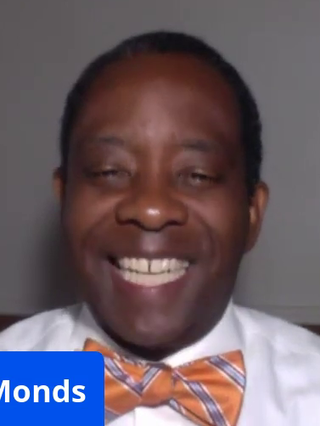
John Monds is an American politician and activist. He was the Libertarian nominee for Governor of Georgia in 2010. He was the first African American to appear on the general election ballot for Governor of Georgia.
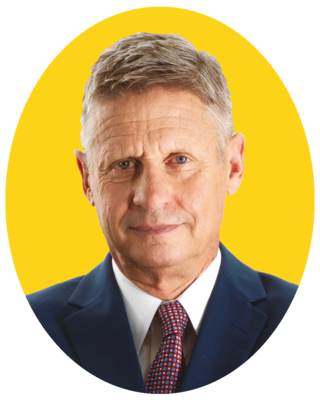
The 2016 Libertarian National Convention was the gathering at which delegates of the Libertarian Party chose the party's nominees for president and vice president in the 2016 national election. The party selected Gary Johnson, a former Governor of New Mexico, as its presidential candidate, with Bill Weld, a former Governor of Massachusetts as his running mate. The convention was held from May 26–30, 2016, in Orlando, Florida.
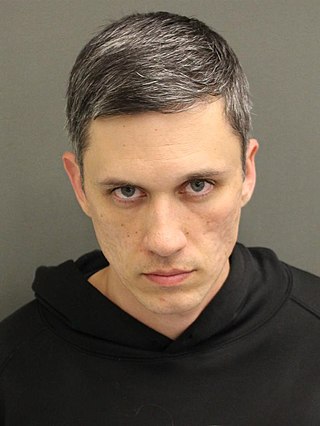
Augustus Sol Invictus is an American far-right political activist, attorney, blogger, and white nationalist.
References
- 1 2 Bill Winter, "1971–2001: The Libertarian Party's 30th Anniversary Year: Remembering the first three decades of America's 'Party of Principle'" Archived May 30, 2012, at archive.today LP News
- ↑ Brian Doherty, Radicals for Capitalism: A Freewheeling History of the Modern American Libertarian Movement, PublicAffairs, 2007, 389–391.
- ↑ R. Swanson, "An Interesting History," Libertarian Party of Florida brochure, 1981.